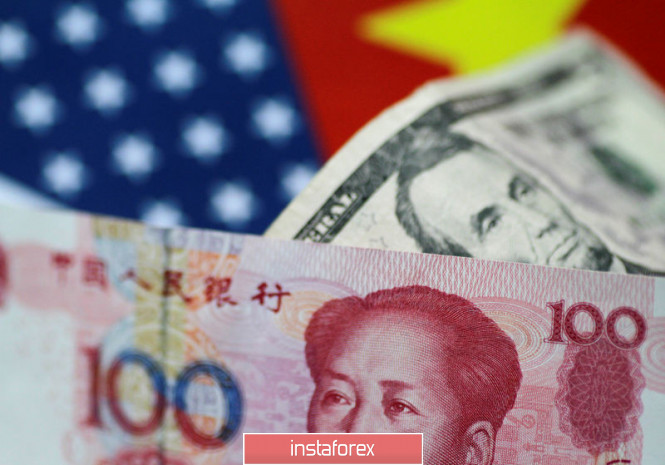
As soon as markets moved away from the the US central bank's "cold shower", since it made it clear that the decision to lower the interest rate was not the beginning of a cycle of easing monetary policy following the June meeting, US President Donald Trump has then spoiled investors' mood by threatening to introduce additional duties on Chinese imports.
China's response was not long in coming. Last weekend, Bloomberg reported that Beijing had ordered its state-owned companies to stop importing agricultural products from the United States.
In addition, China has actually begun to devalue its national currency, the rate of which for the first time in 11 years rose above 7 yuan per US dollar.
It is noteworthy that this level was unshakable even in the midst of a trade war between the two largest economies in the world last year.
The fact that the Chinese authorities let their currency to fall below a key mark suggests that this is a carefully thought-out gambit aimed at mitigating the negative effects of the trade war on the national economy and at the same time preventing the mass exodus of capital from the country. It is also possible that China is signaling to the United States that the conclusion of a trade deal between the countries is unlikely in the near future.
According to analysts, despite the fact that it is the White House that is trying to put pressure on Beijing, Donald Trump is in a losing position for a number of points. Thus, the US leader has repeatedly mentioned the need to weaken the greenback, but the latter is now in fact strengthening against the renminbi, which does not add advantages to the United States in a trade war.
Also, D. Trump needs a steadily growing stock market in order to count on re-election for a second presidential term, but the last time a strong devaluation of the renminbi shocked almost all world markets.
US stock indices are rapidly falling. The S&P 500 index lost about 100 points on Thursday and Friday.
It is highly probable that the "turbulence" will last for a rather long time, and we will see something similar to what happened at the end of last year.
Recall that back then the collapse of the stock exchanges was so rapid that even the Fed was frightened, which had previously made rather tough statements.
Based on the fact that now we are only at the beginning of a powerful market shock, then in the coming weeks, volatility will be prohibitive.
The disappointment of investors by the Federal Reserve's decision on monetary policy last week, as well as the aggravation of tension in trade negotiations between the US and China, led to the strengthening of the Japanese currency.
The USD/JPY pair significantly approached the low of 2019, which was set on January 3 at 104.85.
"This week, economic statistics for China may lead to further weakening of the renminbi. This will ensure that investor demand for the yen will be higher than for the dollar. Accordingly, a further decrease in USD/JPY and testing the psychological mark of 105.00 are potentially possible," said Akira Moroga, a strategist at Aozora Bank.
"However, the fall of the USD/JPY pair below 105.00 now seems unlikely. The US economy is not so weak as to justify a more significant weakening of the dollar against the yen," he added.
As for the main currency pair, the euro returned to the range of a medium-term consolidation of $1.11-1.14 against the US dollar.
The reason for the bears' retreat on EUR/USD was the fact that US employment growth slowed in July. Along with the escalation of trade tensions between Washington and Beijing, this reinforced expectations for the Fed to cut interest rates in September.
The disappointing July ISM business activity figures for the US non-manufacturing sector are likely to inspire the EUR/USD bulls to launch new attacks.
The material has been provided by InstaForex Company - www.instaforex.com